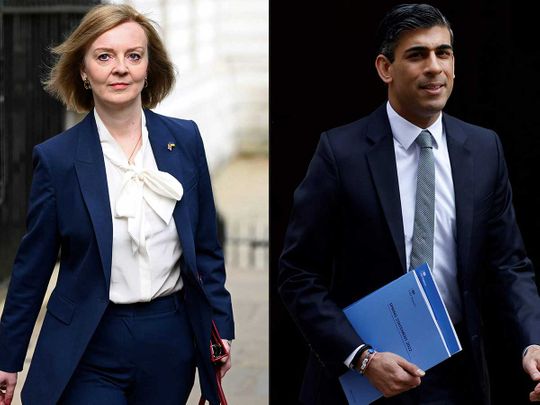
London: Former UK prime minister Liz Truss on Sunday criticised her successor Rishi Sunak "detrimental" tax policies, as the current leader also faced pressure from another predecessor Boris Johnson over his Ukraine strategy.
Truss came to power in September, immediately implementing a radical tax-slashing agenda.
But her plans spooked the markets and threatened to take down the pension sector and she was forced out after only 44 days, making her the country's shortest-serving leader ever.
In her first intervention since losing her job, she argued that the "powerful economic establishment" took her down, and that her replacement Sunak had made a mistake in rejecting all of her tax-cutting measures.
Writing in the Sunday Telegraph, she blamed the "strength of economic orthodoxy and its influence on the market" and said that Sunak's decision to raise corporation tax from 19 to 25 percent was "economically detrimental".
"I am not claiming to be blameless in what happened, but fundamentally I was not given a realistic chance to enact my policies by a very powerful economic establishment, coupled with a lack of political support," she wrote.
The IMF - which criticised Truss' sweeping tax cuts at the time - last week delivered a blow to Sunak when it predicted the UK would be the only G7 country with negative growth in 2023, blaming it partly on the UK's "tighter fiscal and monetary policies".
Sunak has barely been in office 100 days, and despite calming markets, is languishing in the polls as the country's cost-of-living crisis rumbles on.
The re-emergence of Truss and the more visible role taken by Boris Johnson in trying to secure more military support for Ukraine has increased pressure from various factions in Sunak's own party.
During a surprise trip to Washington this week Johnson put pressure on Sunak over the conflict, telling Fox News that he should send fighter jets and "give the Ukrainians what they need as fast as possible. Get this thing done. Forget about Putin."
Johnson was also a visible pro-Ukraine presence at last month's World Economic Forum meeting, which Sunak did not attend.
Johnson and many of his supporters still blame Sunak for triggering his downfall by resigning as his finance minister.
The resulting leadership campaign turned into a bitter fight between Truss and Sunak. The pro-growth faction of MPs that helped her win that contest are reported to be regathering, threatening more headaches for the prime minister.












